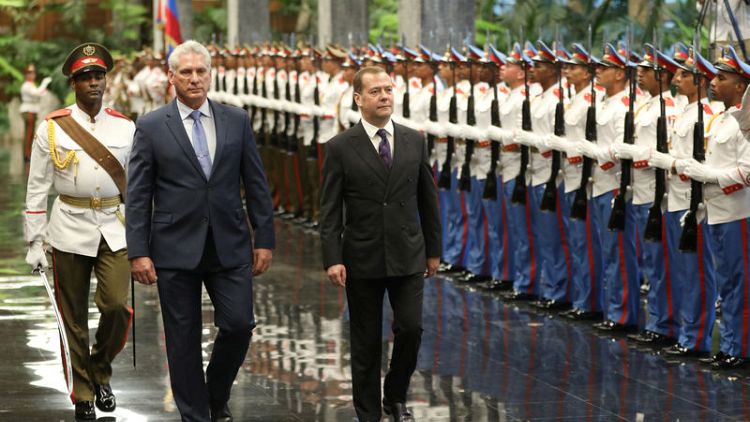By Sarah Marsh and Katya Golubkova
HAVANA/MOSCOW (Reuters) - Russian Prime Minister Dmitry Medvedev kicked off an official two-day visit to Cuba on Thursday in a strong show of Russia's support for the communist-run island as it faces escalating pressure from the United States and resulting fuel shortages.
Medvedev laid a wreath of flowers at the memorial to independence hero Jose Marti on Havana's Revolution Square before meeting with Cuban President Miguel Diaz-Canel and starting official talks. He was due to make a statement to the media later on Thursday.
The former Soviet Union was Cuba's main backer for decades and Moscow has sought to renew its commercial, military and political ties with the island in recent years. The effort is part of Russia's broader strategy to expand its presence in Latin America as a counterweight to China and the United States.
It has also backed Cuba's leftist allies Venezuela and Nicaragua, which are under heavy pressure from the Trump administration as a "troika of tyranny." Russian support in particular has been crucial for Venezuelan President Nicolas Maduro, who is no longer recognized by most Western nations as the country's legitimate leader.
"My impression of Russian policy on Cuba is that it is not Cuba-specific," said Paul Hare, a former British ambassador to Cuba who lectures at Boston University's Pardee School of Global Studies.
"They are most concerned about the Venezuelan piece of the jigsaw and, so far, want to show Cuba that they are willing to back their efforts to ensure Maduro’s survival."
Russia's support for Cuba is insignificant compared to the role the Soviet Union once played, but analysts said it is still very welcome as the island's economy suffers from U.S. sanctions and a steep decline in Venezuelan aid.
Above all, Medvedev's visit - the highest profile Russian tour since that of President Vladimir Putin in 2014 - is symbolically important, they said.
"The symbolism is that the U.S. strategy of economic strangulation will fail because Cuba can turn elsewhere for support - just as it did during the Cold War," said William LeoGrande, a professor of government at American University.
"That's a message to the United States, but also to the Cuban people that they should not despair because they have other friends abroad."
In particular, Russia has the capacity to help Cuba out of its current fuel crisis, which Havana blames on U.S. sanctions on energy shipments to the island, although it remains unclear whether Moscow is willing to make such a large commitment.
RELATIONS REBOOTED
Throughout the Cold War, Moscow propped up Fidel Castro's revolutionary government, providing it with billions of dollars worth of cheap grain, machinery and other goods. Those subsidies disappeared with the 1991 collapse of the Soviet Union and trade plunged.
Relations got a boost once more in 2014 when Russia forgave 90% of Cuba's $35 billion Soviet-era debt and started providing export financing to Russian companies looking to sell to the cash-strapped island.
That has become increasingly important as Western commercial financing is drying up due to growing U.S. hostility.
Russian companies have signed various modest, multi-million dollar deals with Cuba in recent years to upgrade its rickety industrial sector and infrastructure.
During Medvedev's visit, the Russian Export Center (REC) plans to sign a deal with Cuba's Aviaimport to finance around 21 million euros ($23.07 million) worth of projects to provide technical assistance for airplanes produced by Russia, REC Director General Andrei Slepnyov told Reuters.
Separately, REC and Banco Exterior de Cuba plan to sign a financing deal worth around 33.8 million euros to upgrade a steel bars and wire factory. This would allow Cuba's Acinox Comercial to upgrade rolled steel production capacity to 170,000 tonnes per year from 40,000 tonnes now, he said.
"This can help to enhance (Acinox's) competitive positions including international ones ... and result in inflows of forex revenues to the country which would have a positive effect on Cuba's economic situation," Slepnyov said.
DEFYING TRUMP
Russian exports to Cuba more than doubled in 2017 to $414 million and rose to $440 million last year, according to official Cuban data.
While that is less than a third of Spanish, Chinese or Venezuelan exports to Cuba, it looks set to continue rising.
Russian exports include hundreds of cars and minibuses as well as dozens of locomotives that have helped Cuba battle a severe shortage of public transport.
"Russia is wary of becoming a bankroller again so they will only offer enough to prop Cuba up as long as it is politically useful," said Hare, adding Moscow wanted to defy the Trump administration.
"The Russians stood by Assad in Syria and they want to show they are loyal allies to Cuba as well," he said. "And they need to show Iran and North Korea also that the United States' coercive diplomacy will not prevail."
(Reporting by Sarah Marsh in Havana and Katya Golubkova in Moscow; Additional reporting by Nelson Acosta and Marc Frank in Havana; Editing by Richard Chang and Frances Kerry)
